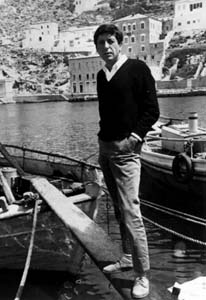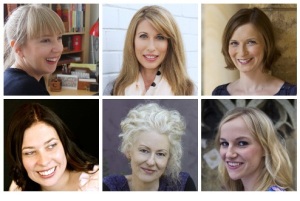All I want for Christmas is…
I’m one of those people who is easy (some would say dull) to buy for. Every year, when my family asks what I want, I usually say books, books, books, magazine subscriptions or notebooks to write in. God, how I love touching and feeling notebooks. And there’s a Moleskin now that links up to Evernote so you can scan in your notes. Wow! I know this is starting to sound like a sponsored post, but I can’t help it if I’m a bit passionate.
I’ve also just been mouth-watering over Allison Tait’s list of gifts for writers (Ernest Hemingway or Sylvia Plath doll, anyone?).
What I like most of all is getting book vouchers so I can wander through indie stores like Gleebooks (Sydney) or Stoneman’s (Castlemaine) or Readings (Carlton) and just browse and choose randomly, usually going purely on design (yup I like doing that).
In the past year, though, I’ve been more and more seduced by the Kindle. Covered in soft leather, I can read it lying on my side in bed (my favourite position). The idea that it holds instant access to not just worlds, but whole solar systems of material, still blows my mind. I need a book right now, and I have it. Great for lazy, procrastinating types. I also prefer it for books to do with work. The highlights and notes function is incredibly useful for reviewing and analytical work, and very quick to jump around and trigger memories and ideas – and I’ve never been comfortable with writing in pencil directly in books; I like the pages designed and clean.
Which leads me to my book-hamper competition in a roundabout way. Just a quick reminder! If you are a fan of any of the following Australian writers — Jon Bauer, Simmone Howell, Walter Mason, Jo Case, Dawn Barker, Jenn J McLeod, Jessie Cole, Annabel Smith, Wendy James or Angela Meyer (first edited collection!) — there’s a chance to win autographed copies of all ten books!
All you need to do is write a little review of my novel, just_a_girl! If you’ve read it, just hop to amazon.com.au and pen a few lines here.
If you haven’t … the book is also available to download for under 10 buckeroos at the same place or you could offer it to someone you love for Xmas (parent of a teenage girl, perhaps!).
All authors really love reviews of their work, and the Amazon.com.au site is pretty new so would love some commentary there. Just see it as a gift to me:-)
I’ve also decided to extend the date of the competition to 15 January. Gives you a bit more time to read just_a_girl in wind-down time…
Which leads me to pressie time. All the books in my Xmas hamper have been carefully selected and fawned upon over the past year. I’ve been thinking about who I might give them to in my inner circle (see below). I’ve linked to their Kindle editions if you’d like to buy them too. They won’t be signed, but, so you can still enter the competition.










- Jon Bauer‘s Rocks in the Belly would go to my Mum. I’ve been raving about it since I first read it, and then he moved to Chewton and joined the writers’ group I’m in. I was a bit scared of him at first (read the book and you’ll get it). But, seriously, it’s a tense and brutal drama, and Mum would enjoy the edginess of it, and the strong characterisation.
- Simmone Howell‘s Girl Defective would go to my mate, Klare. The seedy side of St Kilda. A record store on the verge of collapse. And a strong teen girl lead. She would love it. Simmone is also in my writers’ group and is one of the most dynamic authors I’ve come across in recent years. So witty and her characters have such unique voices.
- Walter Mason‘s Destination Cambodia would go to my friend Jane, who I met on an Intrepid trip to Cambodia. The journey was characterised by hilarity and pathos, and Walter’s book captures the intricacies of the place well. Jane is always on an adventure somewhere and has just returned from trekking in Nepal *jealous*.
- Jo Case‘s Boomer and Me would go to a fellow mum and friend I’ve made in Castlemaine, Karen. We have talked often about what it means to be a ‘good mum’ and what a relief it is to read a book by a mother, finally, who doesn’t pretend to be perfect and jolly hockeysticks and a domestic goddess. I mean, we can’t all be Nigella (although I’ve heard she has some ‘help’ anyway).
- Dawn Barker‘s Fractured would go to my mother-in-law. I think she would enjoy the fast pace, the cool structure and the piercing narrative that makes you question all your assumptions about motherhood…and it’s scary in places; she likes thrills.
- Jenn J McLeod‘s House for All Seasons would go to my Nanna. She is a big reader, likes drama and intertwining lives, along with strong female characters and a good dose of mystery. Whenever I visit Nanna, she has the week’s TV viewing circled into the wee hours of the morning, nearly all crime and suspense. I usually head off for my nanna nap at 9pm and leave her to be a night owl.
- Jessie Cole‘s Darkness on the Edge of Town would go to my boss, Julia. I’m cheating a bit here because she has already read and raved about it. So I know she likes it! When staff at the NSW Writers’ Centre were asked to pick their favourite reads for 2013, Jessie’s debut novel came out on top.
- Annabel Smith‘s Whisky Charlie Foxtrot would go to my sister in law. The book is cerebral, sensitive, pared back and unconventional (just like her). Annabel Smith is my great find of the year. As I’ve said often to anyone who will listen, she should be on the world stage, people! Soon she’ll be mentioned in the same para as Christos.
- Wendy James‘ The Mistake would go to my best friend, Jill. Like Fractured, it’s a thriller that manages to straddle the literary and popular worlds. It teases the reader with its ‘suburban noir’, a dark underbelly of the domestic.
- And finally, Angela Meyer‘s brilliant new edited collection, The Great Unknown, would go to my husband. With its short stories capturing the fantastical, macabre and absurd, he’d be able to dip in and out (while working on his laptop, checking his iPhone and looking at films on his iPad at the same time).
WHAT ABOUT YOU? WHAT BOOKS WOULD YOU LIKE TO RECEIVE THIS CHRISTMAS?


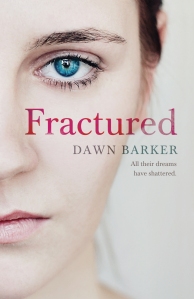 I thought I’d get in the Christmas spirit and hold a little competition …
I thought I’d get in the Christmas spirit and hold a little competition … “It was just Dad and me and Gully living in the flat above the shop in Blessington Street, St Kilda. We, the Martin family, were like inverse superheroes, marked by our defects. Dad was addicted to beer and bootlegs. Gully had ‘social difficulties’ that manifested in his wearing a pig-snout mask 24/7. I was surface clean but underneath a weird hormonal stew was simmering. My defects weren’t the kind you could see just from looking. Later I would decide they were symptoms of Nancy.”
“It was just Dad and me and Gully living in the flat above the shop in Blessington Street, St Kilda. We, the Martin family, were like inverse superheroes, marked by our defects. Dad was addicted to beer and bootlegs. Gully had ‘social difficulties’ that manifested in his wearing a pig-snout mask 24/7. I was surface clean but underneath a weird hormonal stew was simmering. My defects weren’t the kind you could see just from looking. Later I would decide they were symptoms of Nancy.”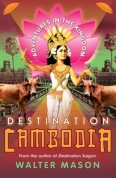 The ancient and mysterious ruins of Cambodia have long captured the imagination of visitors, more so now than ever before. In Destination Cambodia, Walter Mason charts an affectionate, intimate and deeply personal look at a Kingdom that has drawn him back again and again since his youth.
The ancient and mysterious ruins of Cambodia have long captured the imagination of visitors, more so now than ever before. In Destination Cambodia, Walter Mason charts an affectionate, intimate and deeply personal look at a Kingdom that has drawn him back again and again since his youth. How far can you push a child?
How far can you push a child? Bequeathed a century-old house, four estranged friends return to their home town, Calingarry Crossing, where each must stay for a season to fulfil the wishes of their beloved benefactor, Gypsy. Here they finally face the consequences of the tragic accident that occurred twenty years ago and changed their lives forever.
Bequeathed a century-old house, four estranged friends return to their home town, Calingarry Crossing, where each must stay for a season to fulfil the wishes of their beloved benefactor, Gypsy. Here they finally face the consequences of the tragic accident that occurred twenty years ago and changed their lives forever. My dad, he collects broken things … Where other people see junk he sees potential … My dad collects broken people too …
My dad, he collects broken things … Where other people see junk he sees potential … My dad collects broken people too … Whisky and Charlie are identical twins. But everything about them is poles apart. It’s got so bad that Charlie can’t even bear to talk to his brother anymore – until a freak accident steals Whisky from his family, and Charlie has to face the fact he may never speak to his brother again.
Whisky and Charlie are identical twins. But everything about them is poles apart. It’s got so bad that Charlie can’t even bear to talk to his brother anymore – until a freak accident steals Whisky from his family, and Charlie has to face the fact he may never speak to his brother again. An unforgettable novel that brings to life a new mother’s worst fears.
An unforgettable novel that brings to life a new mother’s worst fears. The imaginative stories in The Great Unknown take inspiration from vintage American TV programs such as The Twilight Zone and The Outer Limits—and their contemporaries and successors—paying tribute to the cultural influence these shows have had on lives ‘down under’.
The imaginative stories in The Great Unknown take inspiration from vintage American TV programs such as The Twilight Zone and The Outer Limits—and their contemporaries and successors—paying tribute to the cultural influence these shows have had on lives ‘down under’.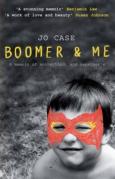 Leo is having trouble fitting in. Whether it’s pulling his pants down in the schoolyard or compulsively saluting Mazdas because the company sponsors his football team, Leo can never seem to say or do the right thing. And Jo is struggling to help him find his place as she juggles work and the ordinary demands of motherhood. But her beloved only child has been reading novels since he started school, amazes strangers with his encyclopaedic knowledge of sport statistics, and displays a wit sharp beyond his years – could he be gifted? In fact, it turns out Leo has Asperger’s Syndrome.
Leo is having trouble fitting in. Whether it’s pulling his pants down in the schoolyard or compulsively saluting Mazdas because the company sponsors his football team, Leo can never seem to say or do the right thing. And Jo is struggling to help him find his place as she juggles work and the ordinary demands of motherhood. But her beloved only child has been reading novels since he started school, amazes strangers with his encyclopaedic knowledge of sport statistics, and displays a wit sharp beyond his years – could he be gifted? In fact, it turns out Leo has Asperger’s Syndrome. The past isn’t dead. It isn’t even past …
The past isn’t dead. It isn’t even past …
 I’ve got to know Annabel (virtually) in the past year. Her debut novel was published by UWA Publishing, like my own. And since
I’ve got to know Annabel (virtually) in the past year. Her debut novel was published by UWA Publishing, like my own. And since 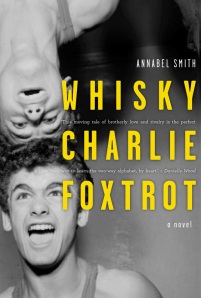 I was writing Whisky Charlie Foxtrot then. After my son was born I wrote a scene in which my protagonist Charlie goes to see his mother, and talks to her about his feeling that his brother was her favourite child. She reveals that it was in fact the opposite, and shares her guilt about this feeling. Parental guilt is something you can’t imagine if you haven’t had children. I’d heard people speak about the feeling that they were constantly doing something wrong, or letting their children down in some way and I’d think, just let it go, stop beating yourself up about it. Then I became a parent and I experienced it for myself and I understood how it gets hold of you. So I wouldn’t have thought of writing that scene unless I had experienced that.
I was writing Whisky Charlie Foxtrot then. After my son was born I wrote a scene in which my protagonist Charlie goes to see his mother, and talks to her about his feeling that his brother was her favourite child. She reveals that it was in fact the opposite, and shares her guilt about this feeling. Parental guilt is something you can’t imagine if you haven’t had children. I’d heard people speak about the feeling that they were constantly doing something wrong, or letting their children down in some way and I’d think, just let it go, stop beating yourself up about it. Then I became a parent and I experienced it for myself and I understood how it gets hold of you. So I wouldn’t have thought of writing that scene unless I had experienced that.